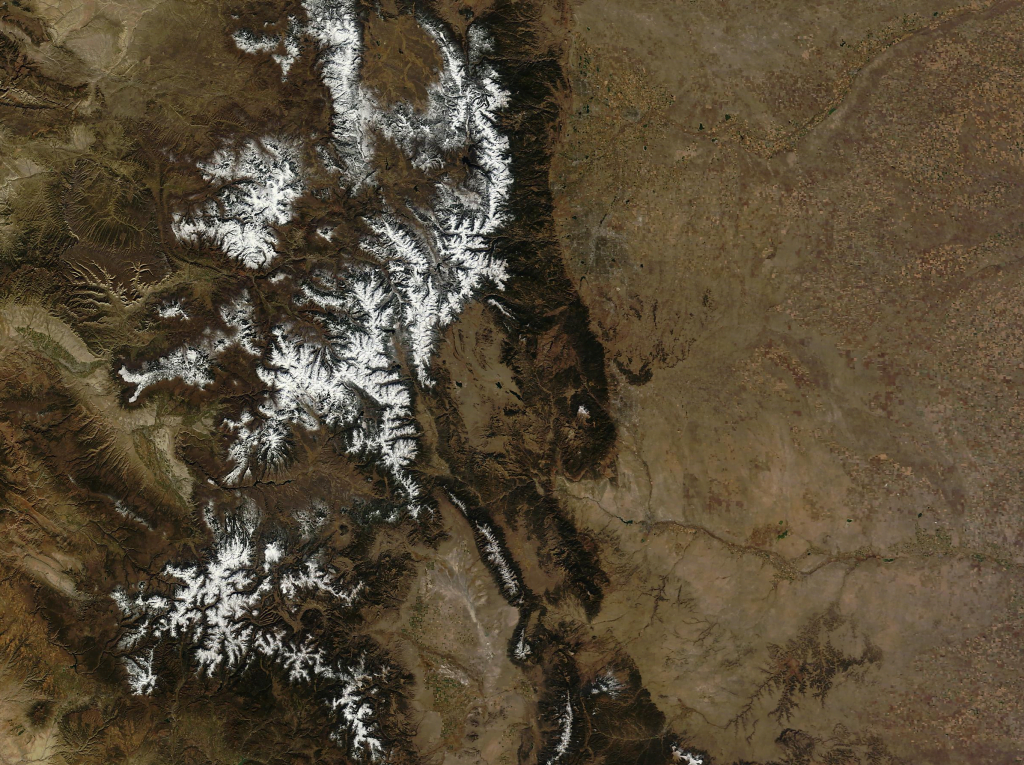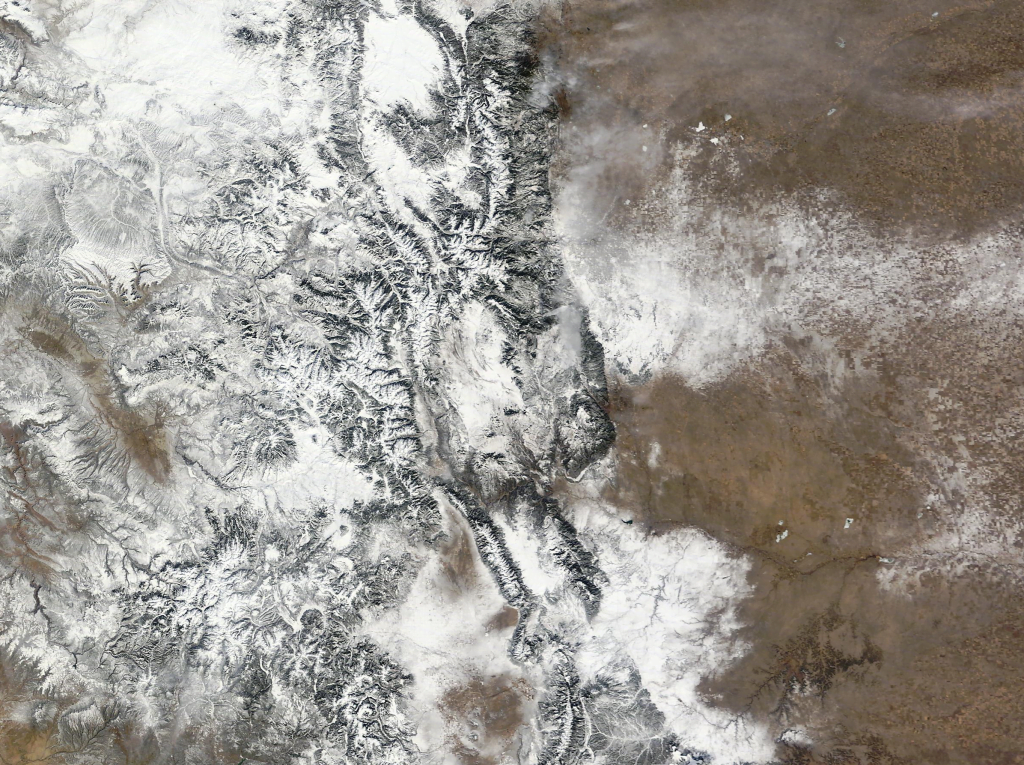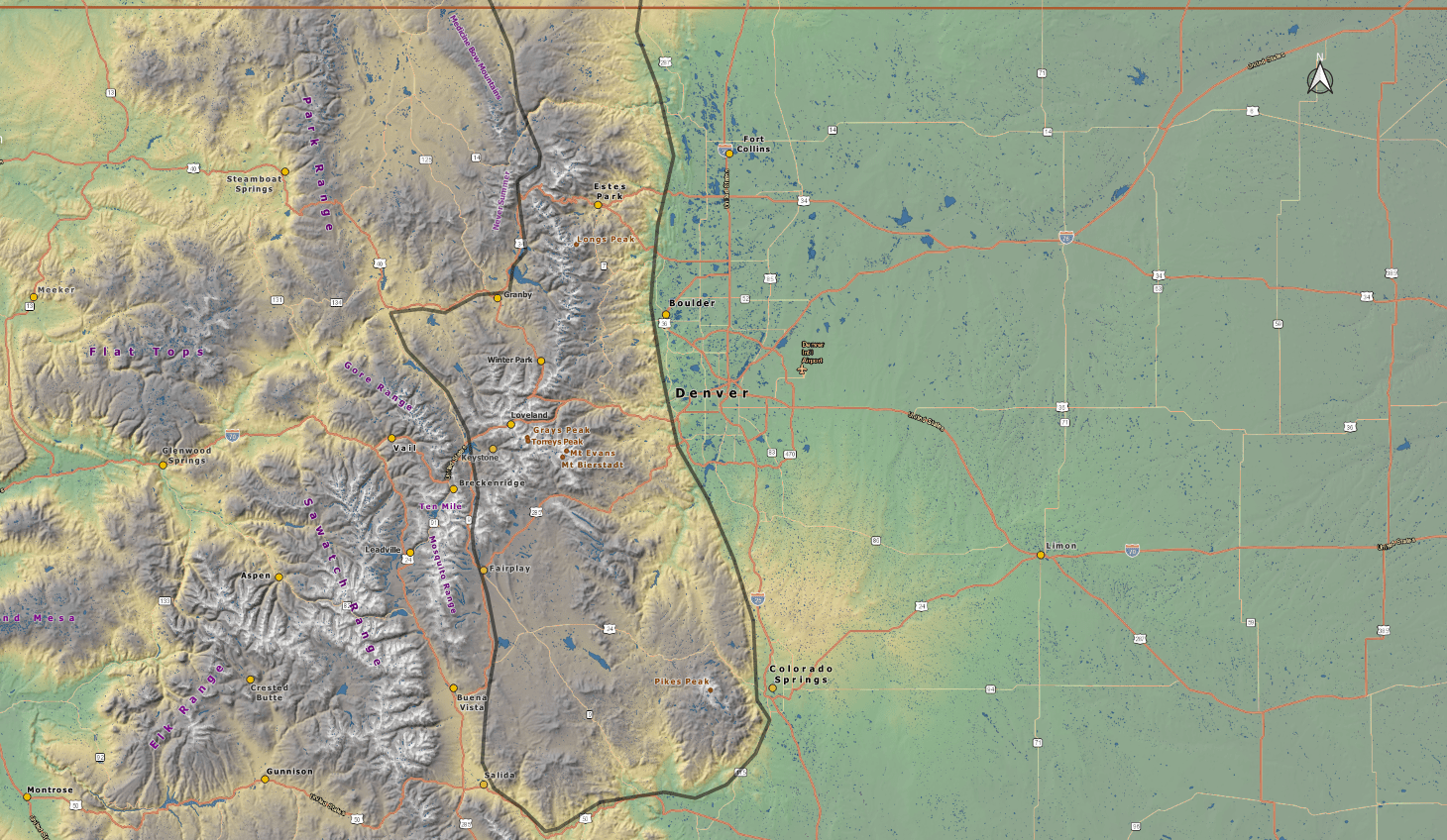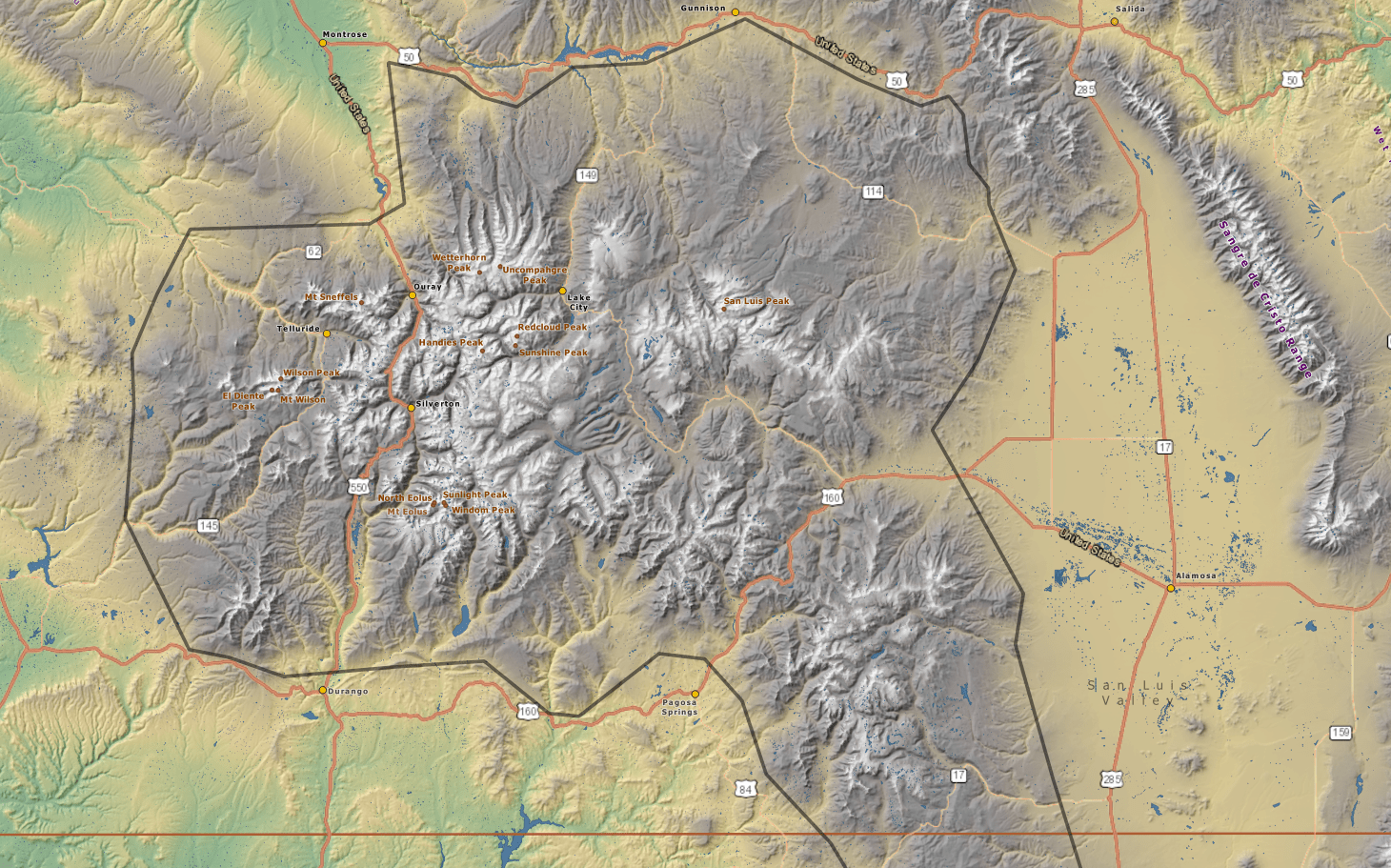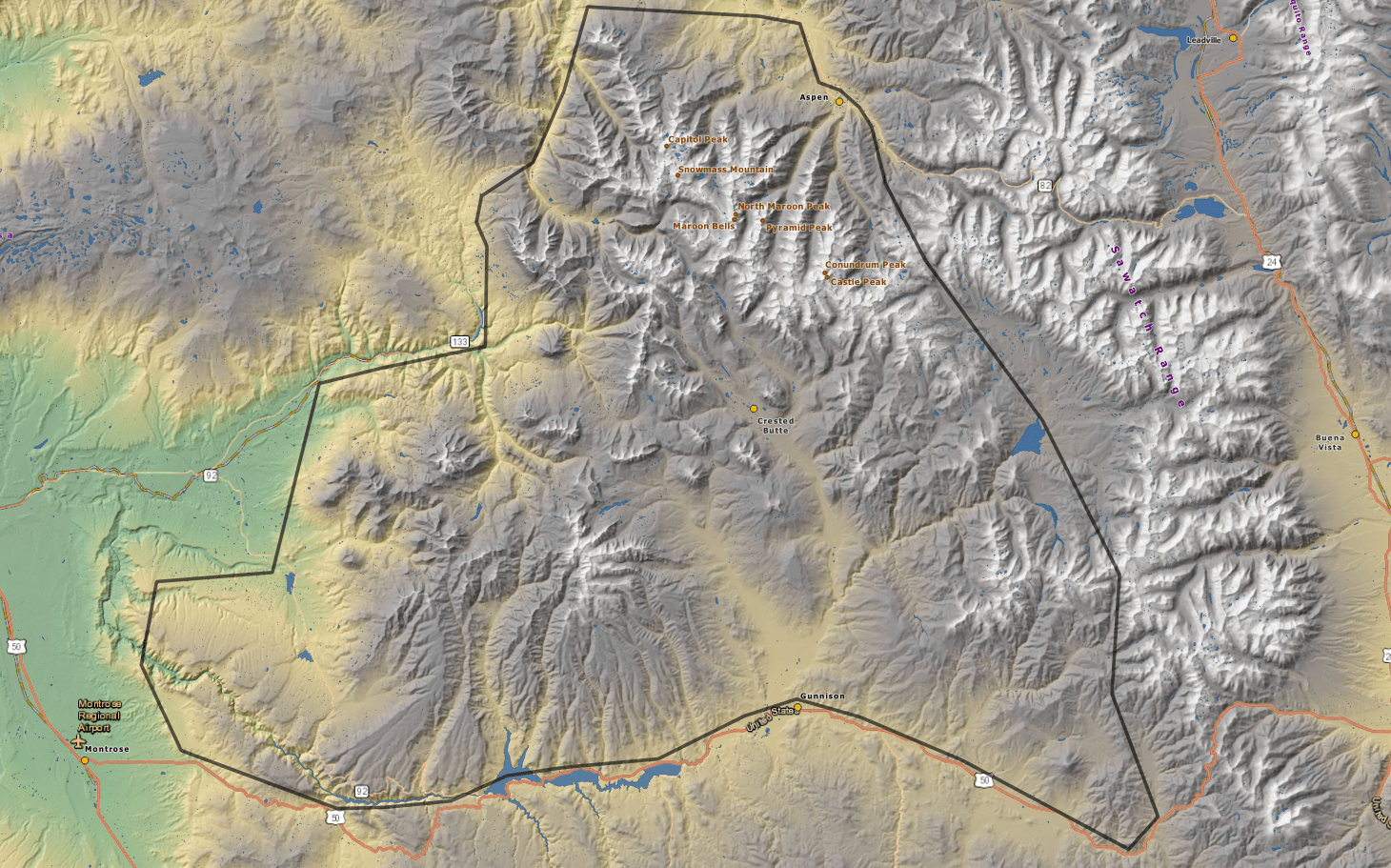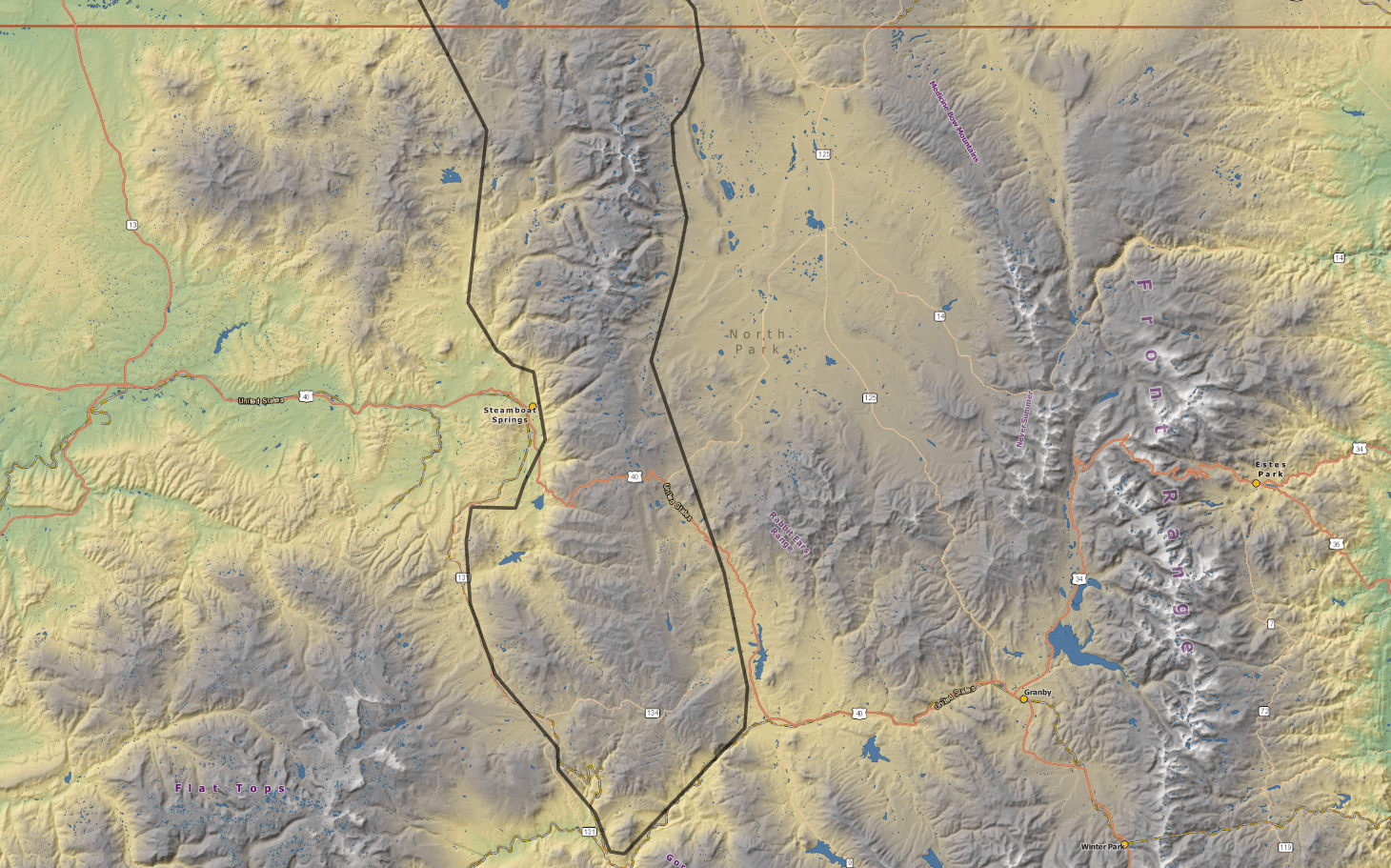Colorado Mountain Ranges
Colorado is home to the Southern Rockies and is the only U.S. state that lies entirely above 3,000′ (1,000 meters) in elevation. The ranges of the Southern Rockies are higher than those of the Middle or Northern Rockies, with many peaks exceeding elevations of 14,000 feet.
Colorado has more than 50 peaks over this elevation, the highest being Mt Elbert in the Sawatch Range, which at 14,433 feet (4,399 m), is the highest point in the 3,000 mile long Rockies.
- The highest elevation mountain range in Colorado is the Sawatch Range, which has 15 peaks over 14,000 feet.
- The largest mountain range by area on Colorado is the San Juan Range, extending north to south 150 miles from Ouray, Colorado to Chama, New Mexico. East to west the range runs 180 miles from Cortez, Colorado to Monte Vista, Colorado
- The longest mountain range in Colorado is the Front Range, which spans 180 miles from north to south
Highest Point – Mt. Elbert at 14,440′ (4,401 m) in elevation, is in the Sawatch Range. Mt Elbert is also the highest point in the Rocky Mountains of North America.
Lowest Point – 3,317′ (1,011 m) on the eastern boundary of Yuma County, where the Arikaree River flows into the state of Kansas, on the eastern plains.
Colorado Mountain Range Map
Front Range Mountains
The Front Range is the longest mountain range in Colorado, stretching approximately 180 miles north-south between Cheyenne, Wyoming and Pueblo, Colorado. From east to west, the Front Range is roughly 97 miles across. When traveling west across the Great Plains, the Front Range will be the first mountain range you encounter.
Highest Point: Grays Peak (14,278′), also the highest peak on the Continental Divide.
Composition: Gneiss, Schist, and Granite
Front Range Trails
Sawatch Mountain Range
Extending southeastward for 100 miles (160 km) from the Eagle River to the city of Saguache, the Sawatch Range contains 15 peaks topping 14,000 feet (4,267 m), also known as 14er’s. The range forms a portion of the Continental Divide, and it’s mountains are high, massive, and relatively gentle in contour.
Highest Point: Mt Elbert (14,433′), the highest peak in the Rocky Mountains.
Composition: Granite, sandstone, quartzite, shale, gneiss, gabbro
Sawatch Mountain Range Trails
San Juan Mountain Range
The San Juan Mountains, in the southern Rockies, extends southeastward for 150 mi (240 km) from Ouray in southwestern Colorado, along the course of the Rio Grande, to the Chama River in northern New Mexico. It is the largest mountain range by area in Colorado. Volcanic rocks in the San Juan Mountains constitute the largest erosional remnant of a once nearly continuous volcanic field that extended over much of the southern Rocky Mountains and adjacent areas in Oligocene and later time.
My personal opinion is that this is the most beautiful part of the state. If I could get away, I would be there today.
Highest Point: Uncompahgre Peak (14,309′)
Composition: Sandstone, shale, limestone, ash-flow tuff, quartz latitic lava, andesitic lava
San Juan Mountain Range Trails
Mosquito & Ten Mile Mountain Range
The Mosquito/Ten Mile range is a single range, but the part of it south of the Continental Divide is called the Mosquito Range, and the part north of the Divide is called the Ten Mile Range.
The range consists of faulted anticlines formed as part of the Sawatch Uplift during the Laramide orogeny, approximately 65 million years ago. The mountains were originally contiguous with the higher Sawatch Range to the west, but were separated during the formation of the rift valley at the headwaters of the Arkansas River, approximately 35 million years ago.
Highest Point: Mt. Lincoln (14,286 ft)
Composition: granite, schist, quartzite
Mosquito/Ten Mile Mountain Range Trails
Sangre de Cristo Mountain Range
The Sangre de Cristo Mountains are fault-block mountains similar to the Teton Range in Wyoming and the Wasatch Range in Utah. There are major fault lines running along both the east and west sides of the range and, in places, cutting through the range. Like all fault block mountain ranges, the Sangre de Cristo’s lack foothills, which means the highest peaks rise abruptly from the valleys to the east and west, over 7,000 feet in only a few miles in some places. The mountains were pushed up around 5 million years ago as one large mass of rock. The Sangre de Cristo range is still being uplifted today as faults in the area remain active.
Highest Point: Blanca Peak (14,351′)
Composition: gneiss, sandstone, limestone, dolomite
Sangre de Cristo Mountain Range Trails
Elk Mountain Range
The mountains sit on the western side of the Continental Divide, largely in southern Pitkin and northern Gunnison counties, in the area southwest of Aspen, south of the Roaring Fork River valley, and east of the Crystal River. Much of the range is located within the White River and Gunnison National Forest, as well as the Maroon Bells-Snowmass Wilderness and Raggeds Wilderness. The Elk Mountains rise nearly 9,000 ft. above the Roaring Fork Valley to the north.
Highest Point: Castle Peak (14,309′)
Composition: Black shale, limestone, sandstone
Gore Mountain Range
The range runs approximately 60 miles (100 km) northwest-to-southeast forming the southern extension of the Park Range, extending southward from Rabbit Ears Pass (U.S. Highway 40) to the Eagle River near Vail. The Colorado River passes through the range at Gore Canyon. The ridges of the range are prominently visible on clear days from the summit of Trail Ridge Road in Rocky Mountain National Park, approximately 50 miles (80 km) to the east. The range is traversed at its southern and southwestern lower flanks by Interstate 70 from Silverthorne to Vail. Much of the range is located within the Arapaho and White River National Forests, and large portions are protected within the Eagles Nest Wilderness.
Highest Point: Mt Powell (13,566′)
Composition: sedimentary, volcanic
Park Mountain Range
The range forms a relatively isolated part of the Continental Divide, extending north-to-south for approximately 40 miles (64 km) along the boundary between Jackson (east) and Routt counties. It separates North Park in the upper basin of the North Platte River on the east from the Elk River basin in the watershed of the Yampa River the west.
It rises steeply out of the Yampa River basin, forming a climatic barrier that receives heavy snowfall in winter. The northern end of the range lies in Wyoming and is known as the Sierra Madre Range.
Steamboat Springs, a popular ski resort community, sits on the southwestern flank of the range, at the base of Mount Werner. Much of the range is located within the Routt National Forest. The range is prominently visible from both sides and forms a picturesque skyline from much of North Park. It is traversed at its southern end by Rabbit Ears Pass which lies along US 40. It is also traversed by Buffalo Pass via a gravel road between Steamboat Springs and Walden.
The Park Range is the snowiest range in Colorado, receiving over 500 inches of snowfall a year.
Highest Point: Mt Zirkel 12,182′
Composition: sedimentary and volcanic rock – some of the oldest geology in the state – up to 1.8 billion years old



